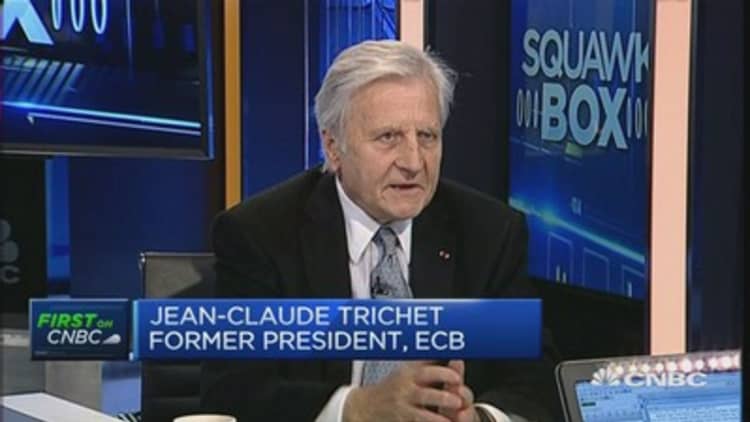
With just two days to go for the Federal Reserve's highly anticipated interest rate decision, former European Central Bank (ECB) President Jean-Claude Trichet has a message for chair Janet Yellen – ignore the International Monetary Fund (IMF) and World Bank's warnings around the dangers of monetary tightening and keep all options on the table.
"The Fed has to be independent of the self-appointed good advisers," Trichet told CNBC on Tuesday. "It is part of the credibility of the monetary policy."
In early September, both the World Bank and the IMF cautioned the U.S. central bank against raising rates until the world economy was on a surer footing. Their warnings followed a summer of turmoil in global markets, triggered by jitters over China's deteriorating economic outlook and the prospect of higher borrowing costs in the world's largest economy.
Read More
"They can give good advice on a more medium term basis, but not on a precise decision at a certain moment," Trichet said. "I really think it is not their mandate, to do that."
If the Fed does decide with "lift-off" this week, it shouldn't catch anyone off guard, he added.
"They were, in my opinion, very clear in warning the market that an increase of rates was likely, so nobody would say in the market that they were not warned in advance."
Although the U.S. is closing in on a rate increase, Trichet said further monetary easing by the ECB shouldn't come as a surprise to investors either.
"It's not new because since the very beginning when QE [quantitative easing] was started, it was clearly said it would go up to September 2016, and over and above this deadline if need be," he said.
Earlier this month, the ECB downgraded its inflation forecast and left the door open to extend and expand its bond buying program that currently stands at 60 billion euros ($66.7 billion) per month and is due to expire in September 2016.
Sharing his assessment of the euro zone economy, Trichet said he believed the single currency bloc was largely "back on its feet", barring Greece.
"The legacy of the sovereign risk is progressively being eliminated, and it's clear that when you look at Spain, Spain is growing now and quite correctly, Ireland is growing, Portugal is growing," he said.
"You have Greece which is a special case, but those who were in the heat of the crisis, now the hard work has been done and the adjustment is paying off now in terms of growth and job creation," he added.
As for the euro, Trichet believed it was trading at an appropriate level given Europe's current growth dynamics.
"At the present moment, it seems to me that taking the European perspective, the present level is correct," he said.
The euro, which is currently trading at $1.13, has been on a roller-coaster ride this year, coming under intense pressure in the first half as concerns around Greece's debt situation reached fever pitch only to stage a recovery in August as it enjoyed relative safe-haven status amidst the turmoil in global markets.
On a year-to-date basis, however, it remains down 6.5 percent against the greenback.


